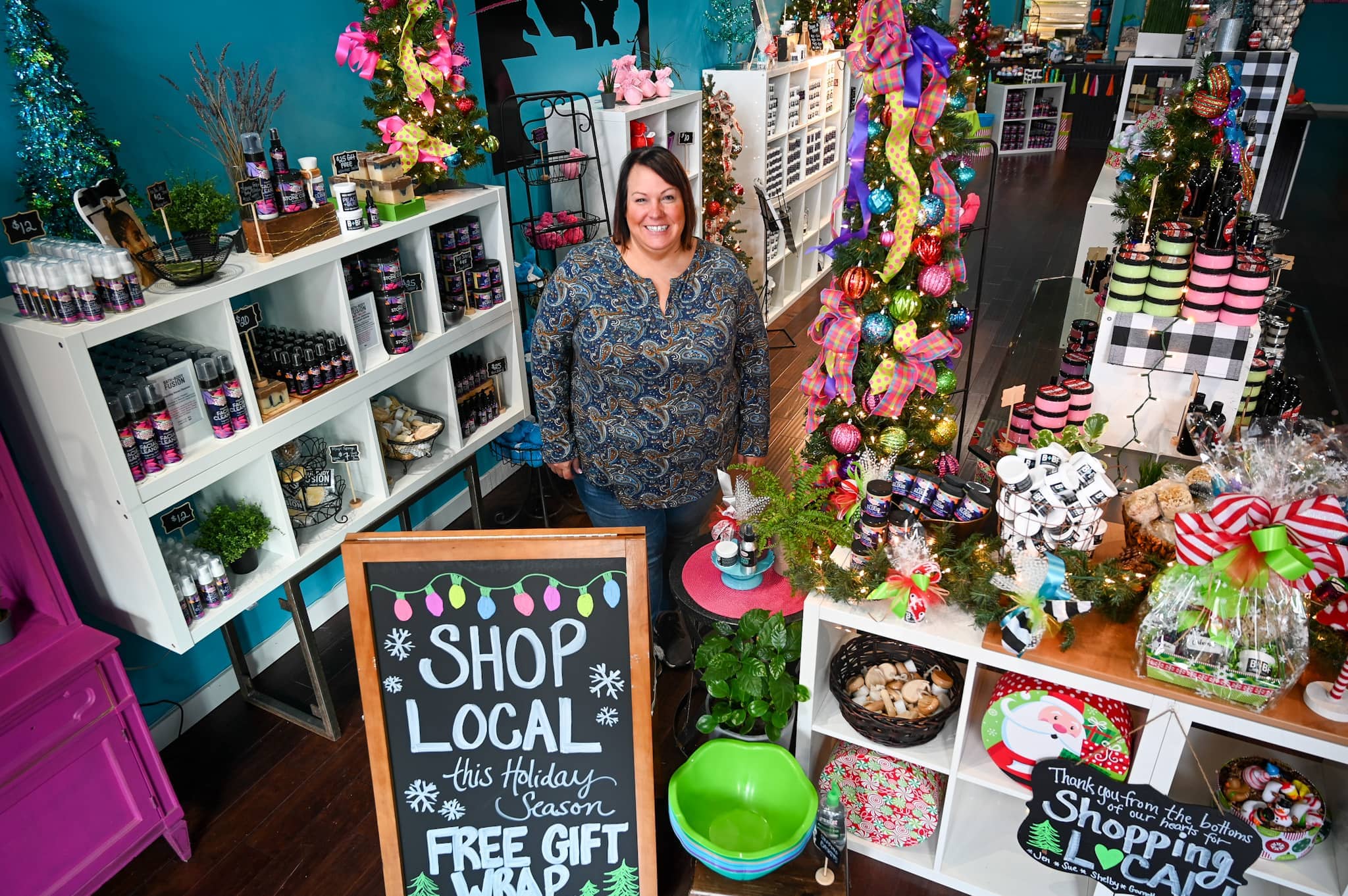 Jenny Ralston, the owner of Bath & Body Fusion, 324 E. State St., Rockford, says shopping local this year is more important than ever as small businesses work to recover from the pandemic. (Photo by Kevin Haas/Rock River Current)
Jenny Ralston, the owner of Bath & Body Fusion, 324 E. State St., Rockford, says shopping local this year is more important than ever as small businesses work to recover from the pandemic. (Photo by Kevin Haas/Rock River Current)By Kevin Haas
Rock River Current
Get our newsletter
ROCKFORD — The global supply chain crisis has pinched small business owners like Keith and Amy Watson, forcing them to wrestle with whether to raise their prices and risk losing customers.
The couple’s retro apparel company Bygone Brand, which sells clothing stamped with local logos that provoke feelings of nostalgia, has struggled at times to get its needed supply of certain sizes and colors. And the cost it pays for the apparel it brands with its designs keeps rising.
“The pricing of our apparel has gone up three times this year already, to a point where we’re struggling to make a profit,” Keith Watson said.
Small business owners across the country have face similar struggles. About 45% of small businesses said they are having domestic supplier issues, according to the most recent U.S. Census Small Business Pulse Survey. That number is up from nearly 27% in January.
‘For the love of the city’
The supply chain issues have exacerbated already difficult circumstances after forced shutdowns in 2020 meant to curb the spread of the coronavirus. An estimated 800,000 small businesses shuttered in the first year of the pandemic, which is 33% more than normal, according to the Federal Reserve.
“At times I feel like I should’ve closed, but then I feel like I bring so much light and love to the downtown,” said Jenny Ralston, founder and CEO of Bath & Body Fusion, 324 E. State St. “I volunteer my time for the love of the city.”
After supply chain issues raised her expenses, Ralston is banking on Small Business Saturday and Stroll on State to help make a dent in her bottom line. Both events happen this Saturday.
“We need them more than ever this year to shop local,” Ralston said. “It’s been a rough few years for many of us.”
Related: ‘They work so hard for the magic of that one night’: Volunteers prepare for Stroll on State
Holiday spending is expected to grow this year between 8.5% and 10.5% to up to $859 billion, according to the National Retail Federation.
Skyler and Lauren Davis, who own Culture Shock, hope people keep local businesses in mind when they plan their holiday shopping. Their store, 2239 Charles St., carries dozens of local companies’ merchandise and is a major supporter of the Winnebago Buy Local movement.
“Every little bit really does go and help the community, help the businesses and help us employ other people, of course, too,” Skyler Davis said.
For Culture Shock, which draws roughly 70% of its business from new and used record sales, the supply crunch on vinyl has been felt as record releases are pushed back.
“I’m constantly just checking the list and emailing or calling people back to tell them, ‘hey it got moved from Dec. 3 to Feb. 25’ or whatever it is now,” Skyler Davis said.
Related: Floods nearly sank Culture Shock in its first 3 months. Here’s how it weathered the storm
Customers typically line up outside the business on Black Friday, which is also Record Store Day, for new releases. Most will be available, Davis said, although there were about a dozen delays. Other supply chain issues were minor, he said, because most of their merchandise is from local companies.
“We’ve had a few products that we’re either doing less with during this increase or just eating the cost on most of it because we don’t want to increase our prices on most items,” he said.
‘A hard road’
Bygone Brand, located at 3600 E. State St. inside the Fairview Shopping Center, hopes that Small Business Saturday will be its biggest day of sales for the year. But, it’s “not going to be a make or break for us,” Keith Watson said.
That’s because the business, which started online before opening its brick-and-mortar store in 2016, has focused on growing its online retail and expanding into more cities around the country.
The pandemic, Amy and Keith Watson said, forced the company to renew its efforts to grow online while the physical location was closed down.
Even with shutdowns over, many small businesses still say their struggling with the effects of the pandemic. About 44% of owners in the Small Business Pulse Survey from Nov. 15-21 said the pandemic is having a moderate negative effect, and 23% said it is still having a large negative effect.
“It’s been a hard road,” Keith Watson said.
“The biggest question that we’ve asked ourselves is, did we do the right thing in opening a business,” Keith Watson said.
It’s been harder, lately, to find the reason, he said, but “the answer always comes back to yes.”
This article is by Kevin Haas. Email him at khaas@rockrivercurrent.com or follow him on Twitter at @KevinMHaas.